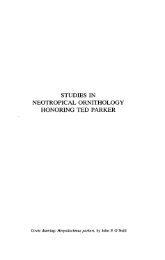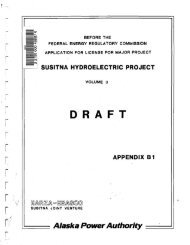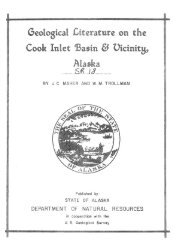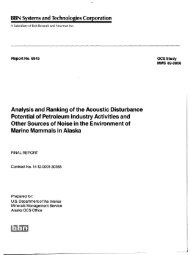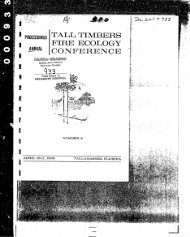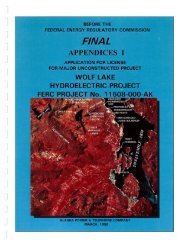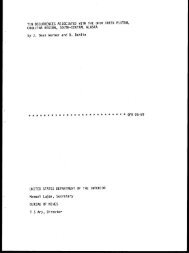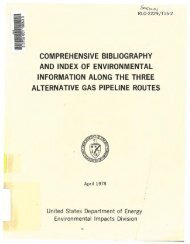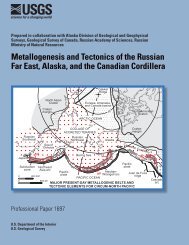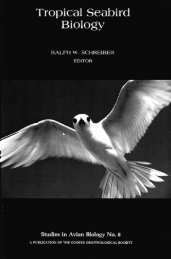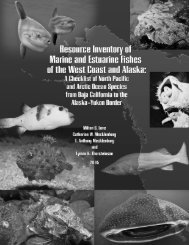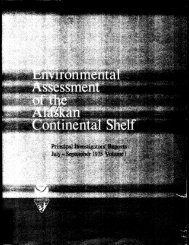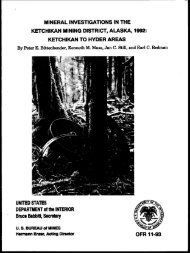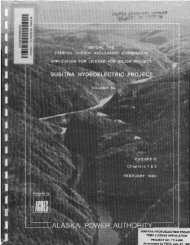- Page 1 and 2:
Outer Continental Shelf Environment
- Page 5:
OUTER CONTINENTAL SHELF ENVIRONMENT
- Page 9:
Outer Continental Shelf Environment
- Page 13 and 14:
TABLE OF CONTENTS List of Figures 5
- Page 15 and 16:
LIST OF FIGURES Figure 2.1. BIOS si
- Page 17 and 18:
LIST OF TABLES Table 2.1. Table 3.1
- Page 19 and 20:
SUMMARY Infaunal bivalve molluscs f
- Page 21 and 22:
FINAL REPORT on BAFFIN ISLAND EXPER
- Page 23 and 24:
they have little or no ability to m
- Page 25 and 26:
2. HYDROCARBON BIOACCUMULATION 2.1
- Page 27 and 28:
Table 2.1. Summary of oil concentra
- Page 29 and 30:
some of the oil during the period b
- Page 31 and 32:
Figure 2.3. Variation of aromatic h
- Page 33 and 34:
Figure 2.5. Mya truncata-GC 2 profi
- Page 35 and 36:
Figure 2.7. Aromatic profiles from
- Page 37 and 38:
Figure 2.9. Mya truncata aromatic p
- Page 39 and 40:
Figure 2.11. Mya truncata-GC 2 prof
- Page 41 and 42:
Figure 2.13. Concentrations of oil
- Page 43 and 44:
Figure 2.15. Mya truncata-Bay 11 (a
- Page 46 and 47:
Figure 2.17. Variation of aromatic
- Page 48 and 49:
Figure 2.19. Serripes groenlandicus
- Page 50 and 51:
Figure 2.21. Concentrations of oil
- Page 52 and 53:
Figure 2.23. Aromatic hydrocarbon p
- Page 54 and 55:
Figure 2.25. Concentrations of oil
- Page 56 and 57:
Figure 2.27. Concentrations of oil
- Page 58 and 59:
Figure 2.30. Astarte aromatic profi
- Page 60 and 61:
Figure 2.32. Concentrations of oil
- Page 62 and 63:
Figure 2.34. Aromatic hydrocarbon G
- Page 64 and 65:
Figure 2.36. Concentrations of oil
- Page 66 and 67:
Astarte, Bay 9, 1-day post-spill, 7
- Page 68 and 69:
increase in water-borne oil concent
- Page 70 and 71:
decision based on GC 2 . Oil levels
- Page 72 and 73:
profiles of tissue extracts of the
- Page 74 and 75:
A similar differential behavior of
- Page 76 and 77:
Table 3.1. Dates of collection and
- Page 78 and 79:
Fixed specimens from the 1981 colle
- Page 80 and 81:
Table 3.4. Summary of histopatholog
- Page 82 and 83:
Table 3.6. Summary of histopatholog
- Page 85 and 86:
Figure 3.1. Granulocytoma in testis
- Page 87 and 88:
Figure 3.5. Excessively vacuolated
- Page 89:
4. BIOCHEMICAL EFFECTS OF OIL The o
- Page 92 and 93:
Table 4.1. Carbohydrates and lipids
- Page 94 and 95:
Table 4.2. Concentrations of petrol
- Page 96 and 97:
Table 4.4. Mean concentrations of f
- Page 98 and 99:
In clams collected immediately befo
- Page 100 and 101:
Table 4.7. A summary of associated
- Page 102 and 103:
parameters measured. Clams from the
- Page 104 and 105:
alone was more gradual and reached
- Page 106 and 107:
interfered with feeding, gonadal de
- Page 108 and 109:
Brown, R.S., C.W. Brown, and S.B. S
- Page 110 and 111:
Malins, D.C. 1982. Alterations in t
- Page 113:
APPENDIX I: PANH COMPOUNDS IN OIL 1
- Page 116 and 117:
SPECTRUM DISPLAY/EDIT **
- Page 118 and 119:
** SPECTRUM DISPLAY/EDIT **
- Page 120 and 121:
** SPECTRUM DISPLAY/EDIT
- Page 122 and 123:
FILE NUMBER 12421
- Page 125 and 126:
** SPECTRUM DISPLAY/EDIT **
- Page 127 and 128:
XX SPECTRUM DISPLAV/EDIT **
- Page 129 and 130:
** SPECTRUM DISPLAY/EDIT **
- Page 131 and 132:
** SPECTRUM DISPLAVY/EDIT **
- Page 133:
APPENDIX III: ASTARTE BOREALIS: BAY
- Page 136 and 137:
** SPECTRUM DISPLAY/EDIT **
- Page 138 and 139:
** SPECTRUM DISPLAY/EDIT **
- Page 140 and 141:
** SPECTRUM DISPLAY/EDIT **
- Page 142 and 143:
** SPECTRUM DISPLAY/EDIT **
- Page 145 and 146:
** SPECTRUM DISPLAY/EDIT **
- Page 147 and 148:
** SPECTRUM DISPLAY/EDIT**
- Page 149 and 150:
** SPECTRUM DISPLAY/EDIT **
- Page 151 and 152:
** SPECTRUM DISPLAY/EDIT **
- Page 153 and 154:
** SPECTRUM DISPLAY/EDIT **X
- Page 155:
APPENDIX V: SERRIPES GROENLANDICUS:
- Page 158 and 159:
** SPECTRUM DISPLAY/EDIT **
- Page 160 and 161:
** SPECTRUM DISPLAY/EDIT **
- Page 162 and 163:
** SPECTRUM DISPLAY/EDIT **
- Page 165:
FEEDING ECOLOGY OF JUVENILE KING AN
- Page 168 and 169:
DIETARY COMPOSITION ...............
- Page 170 and 171:
Figure 13a. Loss of precipitin reac
- Page 172 and 173:
Table 10. Dietary composition of ju
- Page 175 and 176:
ABSTRACT To determine the food requ
- Page 177 and 178:
FEEDING ECOLOGY OF JUVENILE KING AN
- Page 179 and 180:
Figure 1.--Station locations during
- Page 181 and 182:
Figure 3. Station locations during
- Page 183 and 184:
efore freezing. From large catches
- Page 185 and 186:
percentage of the maximum stomach v
- Page 187 and 188:
The amount evacuated is given by th
- Page 189 and 190:
examined entered the dry weight ana
- Page 191 and 192:
Battelle's Pacific Northwest Divisi
- Page 193 and 194:
tows and trawling as techniques for
- Page 195 and 196:
Stomach fullness plotted against ti
- Page 197 and 198:
Figure 4. Decay curve for the clear
- Page 199 and 200:
life of the compartment. Similarly,
- Page 201 and 202:
Figure 6. Exponential decay curve f
- Page 203 and 204:
Figure 8. Exponential decay curve f
- Page 205 and 206:
A comparison of the equations in Ta
- Page 207 and 208:
hard parts with the palps and then
- Page 209 and 210:
Figure 10. Standardized dry weight
- Page 211 and 212:
Table 5. Diel feeding chronology fr
- Page 213 and 214:
These results are comparable to tho
- Page 215 and 216:
Figure 12. The frequency of newly d
- Page 217 and 218:
Table 7. Continued
- Page 219 and 220:
Table 9. Dietary composition (% fre
- Page 221 and 222:
Table 11. Dietary composition of ju
- Page 223 and 224:
Table 12. Dietary composition (% fr
- Page 225 and 226:
Table 14. Soft tissue to hard tissu
- Page 227 and 228:
Table 16. Dietary composition (% of
- Page 229 and 230:
polychaetes in both June and August
- Page 231 and 232:
Table 18. Continued 221
- Page 233 and 234:
and, therefore, had a caloric value
- Page 235 and 236:
Table 21. Caloric intake from vario
- Page 237 and 238:
Table 23. Caloric intake from vario
- Page 239 and 240:
Table 25. Caloric intake from vario
- Page 241 and 242:
Table 27. Results of visual examina
- Page 243 and 244:
They were then fed thawed juvenile
- Page 245 and 246:
eing tested rather than to cross re
- Page 247 and 248:
against its respective antigen and
- Page 249 and 250:
Table 29. Results of visual examina
- Page 251 and 252:
DISCUSSION IMMUNOASSAY The immunolo
- Page 253 and 254:
juvenile king crabs may depend on c
- Page 255 and 256:
Table 32. Comparison of August diet
- Page 257 and 258:
stomach contents but soft-bodied po
- Page 259 and 260:
The assumption that, at least for t
- Page 261 and 262:
shows high similiarity between the
- Page 263 and 264:
supply requires prediction of the s
- Page 265 and 266:
have been shown to readily and rapi
- Page 267 and 268:
Using the diel feeding chronologies
- Page 269 and 270:
to 70 m, potential effects from dis
- Page 271 and 272:
REFERENCES Addy, J. M., D. Levell,
- Page 273 and 274:
Hill, B. J. 1976. Natural food, for
- Page 275:
Tyler, A. V, 1973. Caloric values o
- Page 279:
CLARIFICATION All references to "se
- Page 282 and 283:
4.0 DISCUSSION ....................
- Page 284 and 285:
Figure 3.2-2 Cruise 83-3 larval red
- Page 287 and 288:
ACKNOWLEDGEMENTS This study was ori
- Page 289 and 290:
ABSTRACT The goal of this study was
- Page 291 and 292:
SECTION 1.0 INTRODUCTION The red ki
- Page 293 and 294:
1.1 Study Objectives The goal of th
- Page 295 and 296:
than 50 m. The oceanography of the
- Page 297 and 298:
entering the fishery have declined
- Page 299 and 300:
females. This relationship supports
- Page 301 and 302:
time to temperature. Time from egg-
- Page 303:
Juvenile crab in 2+ to 3+ age class
- Page 306 and 307:
BRISTOL BAY RED KING CRAB CRUISE 83
- Page 308 and 309:
BRISTOL BAY RED KING CRAB CRUISE 83
- Page 310 and 311:
BRISTOL BAY RED KING CRAB STATION I
- Page 312 and 313:
2.1.2 Field Gear and Sampling Metho
- Page 314 and 315:
consisted of 24 hours on all cruise
- Page 316 and 317:
were recorded for subsamples of lar
- Page 318 and 319:
200 individuals of the most common
- Page 320 and 321:
BRISTOL BAY RED KING CRAB STUDY ARE
- Page 322 and 323:
Epibenthic density and biomass data
- Page 324 and 325:
BRISTOL BAY RED KING CRAB CRUISE 83
- Page 326 and 327:
BRISTOL BAY RED KING CRAB CRUISE 83
- Page 328 and 329:
BRISTOL BAY RED KING CRAB CRUISE 83
- Page 330 and 331:
BRISTOL BAY RED KING CRAB CRUISE 83
- Page 332 and 333:
BRISTOL BAY RED KING CRAB CRUISE 83
- Page 334 and 335:
BRISTOL BAY RED KING CRAB CRUISE 83
- Page 336 and 337:
little vertical temperature stratif
- Page 338 and 339:
TABLE 3.1-1 (continued) 328
- Page 340 and 341:
BRISTOL BAY RED KING CRAB PERCENT G
- Page 342 and 343:
etween Unimak Island and Port Molle
- Page 344 and 345:
BRISTOL BAY RED KING CRAB SIDE-SCAN
- Page 346 and 347:
BRISTOL BAY RED KING CRAB CRUISE 83
- Page 348 and 349:
TABLE 3.2-1 MEAN LARVAL RED KING CR
- Page 350 and 351:
stations in this area where larval
- Page 352 and 353:
three-day period in June showed rat
- Page 354 and 355:
BRISTOL BAY RED KING CRAB DIEL VERT
- Page 356 and 357:
TABLE 3.3-1 GEOMETRIC MEAN DENSITIE
- Page 358 and 359:
during the June cruise (83-3). duri
- Page 360 and 361:
TABLE 3.4-2 NUMBER OF POST LARVAL R
- Page 362 and 363:
TABLE 3.4-3 NUMBER OF POST LARVAL R
- Page 364 and 365:
BRISTOL BAY RED KING CRAB TRYNET SA
- Page 366 and 367:
BRISTOL BAY RED KING CRAB TRYNET AN
- Page 368 and 369:
BRISTOL BAY RED KING CRAB DISTRIBUT
- Page 370 and 371:
BRISTOL BAY RED KING CRAB DISTRIBUT
- Page 372 and 373:
NORTH ALEUTIAN BASIN RED KING CRAB
- Page 374 and 375:
TABLE 3.5-3 CORRELATION MATRIX FOR
- Page 376 and 377:
TABLE 3.5-5 CORRELATION MATRIX FOR
- Page 378 and 379:
BRISTOL BAY RED KING CRAB DISTRIBUT
- Page 380 and 381:
BRISTOL BAY RED KING CRAB DISTRIBUT
- Page 382 and 383:
at one 50 m deep TB station west of
- Page 384 and 385:
TABLE 3.6-2 SUMMARY OF BIOLOGICAL I
- Page 386 and 387:
TABLE 3.7-1 SUMMARY OF TRYNET CATCH
- Page 388 and 389:
BRISTOL BAY RED KING CRAB DISTRIBUT
- Page 390 and 391:
group AB, especially the fish speci
- Page 392 and 393:
BRISTOL BAY RED KING CRAB LARVAL DE
- Page 394 and 395:
BRISTOL BAY RED KING CRAB LARVAL DE
- Page 396 and 397:
BRISTOL BAY RED KING CRAB KNOWN CIR
- Page 398 and 399:
Bay and west to Cape Newenham. The
- Page 400 and 401:
BRISTOL BAY RED KING CRAB 1978, 197
- Page 402 and 403:
protection against predators, as we
- Page 404 and 405:
which provides for adequate food (i
- Page 406 and 407:
4.5 Potential Effects of Oil and Ga
- Page 408 and 409:
to a great extent tidally driven, t
- Page 410 and 411:
(1983b), the same volume of oil is
- Page 412 and 413:
BRISTOL BAY RED KING CRAB SURFACE O
- Page 414 and 415:
Overt, rapid mortality of adult cra
- Page 416 and 417:
viability of the gametes is impaire
- Page 418 and 419:
detected by chemosensory organs. Pe
- Page 420 and 421:
and Alaskan species of shrimp and c
- Page 422 and 423:
interannual variability in abundanc
- Page 424 and 425:
that are killed by oil north of Uni
- Page 426 and 427:
Long-term, sublethal effects may al
- Page 428 and 429:
Botsford, L. and D. Wickham. 1978.
- Page 430 and 431:
Harris, R.P., V. Bergudugo, E.D.S.
- Page 432 and 433:
Kurata, H. 1961. Studies on the lar
- Page 434 and 435:
Paul, A.J., J. Paul, P. Shoemaker a
- Page 436 and 437:
Takeuchi, I. 1962, trans. 1967. On
- Page 439:
APPENDIX A MEAN LARVAL RED KING CRA
- Page 443 and 444:
APPENDIX B TRAWL GEAR TYPES USED BY
- Page 445:
APPENDIX C: TRAWL/DREDGE NOTES 435
- Page 448 and 449:
APPENDIX C (continued) 438
- Page 450 and 451:
APPENDIX C (continued) 440
- Page 452 and 453:
APPENDIX C (continued) 442
- Page 454 and 455:
APPENDIX C (continued) 444
- Page 456 and 457:
APPENDIX C (continued) 446
- Page 458 and 459:
APPENDIX C (continued) 448
- Page 460 and 461:
APPENDIX C (continued) 450
- Page 462 and 463:
APPENDIX C (continued) 452
- Page 465 and 466:
APPENDIX D GUT CONTENT ANALYSIS FIE
- Page 467 and 468:
APPENDIX D (continued) 457
- Page 469:
APPENDIX E: MULTIPLE LINEAR REGRESS
- Page 472 and 473:
APPENDIX E (continued) 462
- Page 474 and 475:
APPENDIX E (continued) 464
- Page 476 and 477:
APPENDIX E (continued) 466
- Page 478 and 479:
APPENDIX E (continued) 468
- Page 480 and 481:
APPENDIX E (continued) 470
- Page 483:
APPENDIX F: JUVENILE RED KING CRAB
- Page 486 and 487:
APPENDIX F (continued) Figure Fl. S
- Page 489:
DISTRIBUTION AND ABUNDANCE OF DECAP
- Page 492 and 493:
4.0 DISTRIBUTION AND ABUNDANCE OF T
- Page 494 and 495:
8.3 Larval Decapod Biology, Sensiti
- Page 496 and 497:
Figure 3.4 Figure 3.5 Figure 3.6 Fi
- Page 498 and 499:
Figure 5.8 Distribution and abundan
- Page 500 and 501:
Figure 6.29 Distribution and abunda
- Page 502 and 503:
Table 4.5 Table 4.6 Table 5.1 Table
- Page 505 and 506:
ACKNOWLEDGMENTS We are indebted to
- Page 507 and 508:
1.0 GENERAL INTRODUCTION 1.1 Justif
- Page 509 and 510:
Larval stages are generally conside
- Page 511 and 512:
extent in 1982) did we have the opp
- Page 513:
The sections of this report describ
- Page 516 and 517:
Table 2.1. Dates and sources of zoo
- Page 518 and 519:
techniques which attempt to equally
- Page 520 and 521:
verification of results or examinat
- Page 522 and 523:
cation of these larvae and the vari
- Page 524 and 525:
meters) was often similar (generall
- Page 526 and 527:
Bongo frame, the MOCNESS frame cann
- Page 528 and 529:
abundance within strata were made b
- Page 530 and 531:
520
- Page 532 and 533:
522
- Page 534 and 535:
524
- Page 536 and 537:
526
- Page 538 and 539:
528
- Page 540 and 541:
Figure 2.21 Locations and boundarie
- Page 542 and 543:
Figure 3.1. Location of proposed le
- Page 544 and 545:
characterized as part of the subarc
- Page 546 and 547:
Fig. 3.4. Distribution of male red
- Page 548 and 549:
Figure 3.5. Abundance estimates of
- Page 550 and 551:
pheromone cues could impair males'
- Page 552 and 553:
on larvae hatched elsewhere, includ
- Page 554 and 555:
aggregations could influence suscep
- Page 556 and 557:
Fig. 3.7a. Distribution and relativ
- Page 558 and 559:
the benthic habitat associated with
- Page 560 and 561:
conclusions of Slizkin (1973) who r
- Page 562 and 563:
A further observation germane to th
- Page 564 and 565:
Fig. 3.10. Major king crab catch ar
- Page 566 and 567:
3.4 Results 3.4.1 Distribution and
- Page 568 and 569:
11 and 12 (Figs. 3.11, 3.12). Too f
- Page 570 and 571:
Table 3.1. Number of zooplankton sa
- Page 572 and 573:
Because of the poor spatial coverag
- Page 574 and 575:
made them imperfect in areas (Fig.
- Page 576 and 577:
Table 3.2. A summary of larval red
- Page 578 and 579:
Fig. 3.15. Distribution and relativ
- Page 580 and 581:
Fig. 3.16. Interannual differences
- Page 582 and 583:
[An interesting note on annual abun
- Page 584 and 585:
Fig. 3.17a. Frequency of occurrence
- Page 586 and 587:
The occurrence of a multi-stage lar
- Page 588 and 589:
megalopae. These combinations of ye
- Page 590 and 591:
to early August (Fig. 3.17b), and s
- Page 592 and 593:
Fig. 3.21. Vertical distribution of
- Page 594 and 595:
consequences of oil exposure scenar
- Page 596 and 597:
abundance in time and space is corr
- Page 598 and 599:
Female crabs were abundant in strat
- Page 600 and 601:
observing that: 1) the mature femal
- Page 602 and 603:
Much research on king crab biology
- Page 604 and 605:
12) Determine interannual differenc
- Page 606 and 607:
around the traditional king crab fi
- Page 608 and 609:
Table 4.1. Historic U.S. Tanner cra
- Page 610 and 611:
(NMFS) since the early 1970's. In a
- Page 612 and 613:
Fig. 4.2b Centers of abundance of b
- Page 614 and 615:
4.3 Reproduction and Description of
- Page 616 and 617:
oth species for 80 mm specimens, bu
- Page 618 and 619:
from all stations were pooled for v
- Page 620 and 621:
Fig. 4.4. Timing of appearance of l
- Page 622 and 623:
Table 4.3. Timing of appearance of
- Page 624 and 625:
megalops larvae of both species and
- Page 626 and 627:
Table 4 . 5 .Proportion of Stage II
- Page 628 and 629:
Fig. 4.5. Temporal aspects of devel
- Page 630 and 631:
assumes a relatively homogeneous di
- Page 632 and 633:
Methods for analysis of depth distr
- Page 634 and 635:
Fig. 4.7. Vertical distribution of
- Page 636 and 637:
were found in the upper 40 m. Eight
- Page 638 and 639:
From the diel stations, 10% or more
- Page 640 and 641:
difficulties in quantitatively samp
- Page 642 and 643:
Figure 4.10 Distribution and abunda
- Page 644 and 645:
The distribution patterns for C. ba
- Page 646 and 647:
3. Most of the larval hatchout occu
- Page 649 and 650:
5.0 DISTRIBUTION AND ABUNDANCE OF O
- Page 651 and 652:
Table 5.2. Early life history infor
- Page 653 and 654:
tions are not available for them. D
- Page 655 and 656:
to as wide as 250 mm wide by a maxi
- Page 657 and 658:
alutaceus larvae were collected fro
- Page 659 and 660:
Table 5.3. Species list of non-Chio
- Page 661 and 662:
annually, which resulted in little
- Page 663 and 664:
Figure 5.1 Vertical distribution of
- Page 665 and 666:
examining their vertical larval dis
- Page 667 and 668:
also July of 1981. Within strata, b
- Page 669 and 670:
Figure 5.3 Seasonal occurrence of l
- Page 671 and 672:
Figure 5.5 Mean density and one sta
- Page 673 and 674:
Long-shelf density of Erimacrus lar
- Page 675 and 676:
Figure 5.6 Frequency-of-occurrence
- Page 677 and 678:
Figure 5.7 Distribution and abundan
- Page 679 and 680:
Figure 5.9 Distribution and abundan
- Page 681 and 682:
Figure 5.10 Distribution of mean de
- Page 683 and 684:
Figure 5.12 Distribution of mean de
- Page 685 and 686:
at 21% of all stations sampled and
- Page 687 and 688:
Table 5.7. Frequency of occurrence
- Page 690 and 691:
1980
- Page 692 and 693:
2) In May and June of all years com
- Page 694 and 695:
Figure 5.15 Locations and densities
- Page 696 and 697:
excess of 100,000/100 m² were foun
- Page 698 and 699:
Table 5.9. Frequency of occurrence
- Page 700 and 701:
Distribution and Abundance: Larvae
- Page 702 and 703:
Table 5.10. Stratum number Frequenc
- Page 704 and 705:
Figure 5.20. Mean density and one s
- Page 706 and 707:
Pandalus borealis - Haynes 1979 Pan
- Page 708 and 709:
Table 6.1. Comparison of life histo
- Page 710 and 711:
this age are non-reproducing or ste
- Page 712 and 713:
Bering Sea stocks during the early
- Page 714 and 715:
in the Bering Sea but Butler (1980)
- Page 716 and 717:
6.3 Hippolytidae The Hippolytidae a
- Page 718 and 719:
summer food for spotted seals. Fede
- Page 720 and 721:
21% of the 1976 tows (Feder 1978).
- Page 722 and 723:
Figure 6.1 Frequency of occurrence
- Page 724 and 725:
Table 6.4. Frequency of occurrence
- Page 726 and 727:
A stage frequency histogram for P.
- Page 728 and 729:
Figure 6.4 Pandalus tridens stage f
- Page 730 and 731:
ottom. A pandalid larval type that
- Page 732 and 733:
Pandalopsis dispar was taken only o
- Page 734 and 735:
Figure 6.7 Distribution and abundan
- Page 736 and 737:
Figure 6.9 Distribution and abundan
- Page 738 and 739:
Figure 6.10 P. borealis larval abun
- Page 740 and 741:
outer shelf with the oceanic area b
- Page 742 and 743:
Since P. tridens occurred less freq
- Page 744 and 745:
Figure 6.13 Distribution and abunda
- Page 746 and 747:
outer shelf during those years. Sam
- Page 748 and 749:
Figure 6.16 Vertical depth distribu
- Page 750 and 751:
Figure 6.17 Distribution and abunda
- Page 752 and 753:
SI zoeae were first taken in March
- Page 754 and 755:
Figure 6.19 Distribution and abunda
- Page 756 and 757:
Figure 6.20 Distribution and abunda
- Page 758 and 759:
Table 6.7. Cross-shelf comparison o
- Page 760 and 761:
during PROBES 1980 and 1981 samplin
- Page 762 and 763:
4) Larvae were distributed homogene
- Page 764 and 765:
Figure 6.25 Crangon spp. stage freq
- Page 766 and 767:
Figure 6.26 Argis spp. distribution
- Page 768 and 769:
Figure 6.27 Distribution and abunda
- Page 770 and 771:
Figure 6.29 Distribution and abunda
- Page 772 and 773:
Figure 6.31 Crangon spp. larval abu
- Page 774 and 775: Table 6.8. Cross-shelf comparison o
- Page 776 and 777: 2) The intermolt period of about 2
- Page 778 and 779: Figure 6.33, these deepwater shrimp
- Page 780 and 781: Figure 6.35 Distribution and abunda
- Page 782 and 783: Table 6.9. Cross-shelf comparison o
- Page 784 and 785: 3) Larvae were in the water column
- Page 787 and 788: 7.0 DISTRIBUTION AND ABUNDANCE OF H
- Page 789 and 790: Table 7.2. Reproductive data for fo
- Page 791 and 792: and 1976 (between the Pribilof Isla
- Page 793 and 794: Figure 7.1 Paguridae stage frequenc
- Page 795 and 796: Figure 7.2 Distribution and abundan
- Page 797 and 798: Figure 7.4 Distribution and abundan
- Page 799 and 800: Table 7.3. Cross-shelf comparison o
- Page 801 and 802: Figure 7.6 Mean larval densities of
- Page 803 and 804: Figure 7.8 Vertical depth distribut
- Page 805: 3) Larval duration in the plankton
- Page 808 and 809: and oil transport developed for the
- Page 810 and 811: Figure 8.1 Current directions and n
- Page 812 and 813: discussed by participants at the St
- Page 814 and 815: Larval Feeding: Studies with other
- Page 816 and 817: and high resultant mortality. Sonnt
- Page 818 and 819: The third reproductive effect invol
- Page 820 and 821: to and impact on, pelagic and benth
- Page 822 and 823: 3. Oil was mixed to a 50-m depth in
- Page 826 and 827: One or two very weak year-classes r
- Page 828 and 829: were covered by lower concentration
- Page 830 and 831: Figure 8.3 Surface oil trajectories
- Page 832 and 833: are to the west-southwest (Fig. 8.4
- Page 834 and 835: Large volumes of oil reaching shall
- Page 836 and 837: of time in the neuston layer. If th
- Page 838 and 839: in this area and so deleterious eff
- Page 840 and 841: 4. Exposure of developing eggs and
- Page 843 and 844: LITERATURE CITED Adams, A. E. 1979.
- Page 845 and 846: Butler, T. H. 1971. A review of the
- Page 847 and 848: Feder, H. M. and S. C. Jewett. 1980
- Page 849 and 850: Haynes, E. B. 1980a. Larval morphol
- Page 851 and 852: Ivanov, B. G. 1964. Results in the
- Page 853 and 854: Kurata, H. 1960. Studies on the lar
- Page 855 and 856: Douglas Wolfe, ed. Fate and Effects
- Page 857 and 858: Motoh, H. 1976. The larval stages o
- Page 859 and 860: king crab Paralithodes camtschatica
- Page 861 and 862: Roncholt, L. L. 1963. Distribution
- Page 863 and 864: Somerton, D. A. and R. A. Macintosh
- Page 865 and 866: Wencker, D. L., L. S. Incze, and D.
- Page 867: APPENDICES: A: S.E. Bering Sea Shri
- Page 871 and 872: APPENDIX B. References used for ide
- Page 873: APPENDIX C. Paguridae and Lithodida
- Page 877:
TABLE OF CONTENTS ABSTRACT .......
- Page 880 and 881:
zoeae of these two species from the
- Page 882 and 883:
the curved lateral processes reach
- Page 884 and 885:
Additional Morphological Features U
- Page 886 and 887:
APPLICATION OF FINDINGS TO FIELD ST
- Page 888:
Kurata, H. 1963. Larvae of Decapoda



